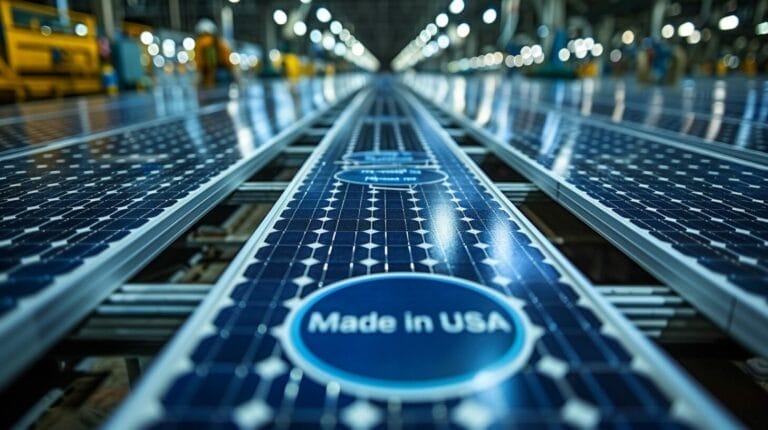Solar Panel Module Efficiency: Maximizing Energy Conversion
Curious about maximizing energy conversion with solar panel modules? Wondering how efficient they can be? Explore techniques for optimizing solar panel performance to enhance the conversion of solar energy into usable electricity.
Key Takeaways
- Implement strategic installation angles and directions for optimal energy production.
- Regular maintenance is essential for maximizing solar panel performance.
- Invest in high-quality panels with advanced technologies for efficiency.
- Explore innovative solutions like smart inverters and energy storage for enhanced conversion.
- Consider factors like temperature sensitivity and real-world performance to maximize energy conversion.
Understanding the Basics of Solar Panel Efficiency

In understanding the basics of solar panel efficiency, we delve into the science that underpins the generation of electricity through solar cells and investigate the key factors influencing their effectiveness. Solar energy is harnessed through photovoltaic (PV) cells, which convert sunlight into electricity. The efficiency of solar modules, consisting of multiple solar cells, is essential in maximizing energy conversion. High-efficiency solar panels play a pivotal role in ensuring the best energy output from the available sunlight.
Cell efficiency is a critical aspect affecting the overall performance of solar panels. Higher cell efficiency means a greater ability to convert sunlight into electricity, leading to improved overall solar panel efficiency. Material quality, design, and technological advancements contribute significantly to enhancing cell efficiency and, as a result, the efficiency of solar modules. By understanding these principles, we can work towards developing more innovative and effective high-efficiency solar panels to harness solar energy efficiently.
Exploring the Types of Solar Panel Modules

Exploring various types of solar panel modules reveals distinct differences in efficiency and cost factors. When considering solar panel modules, three common types stand out: monocrystalline panels, polycrystalline panels, and thin-film solar panels. Each type possesses unique characteristics that impact energy conversion and overall performance.
To gain a better understanding of these solar panel modules, let’s compare them in the table below:
| Solar Panel Type | Efficiency | Cost |
|---|---|---|
| Monocrystalline Panels | High | Higher |
| Polycrystalline Panels | Moderate | Moderate |
| Thin-Film Solar Panels | Lower | Lower |
Monocrystalline panels are known for their high efficiency but come at a higher cost compared to polycrystalline panels, which offer moderate efficiency at a more moderate cost. Thin-film solar panels, while less efficient, provide a cost-efficient option for those looking to invest in solar energy. Understanding the differences between these solar panel modules is essential when aiming to maximize energy conversion and make informed decisions for your solar energy system.
Assessing the Efficiency of Different Solar Panel Modules

When contemplating solar panel modules, one vital aspect to ponder is the efficiency of each type in converting sunlight into electricity. Solar companies are continuously working to enhance the efficiency of their panels. High-efficiency panels are at the forefront of innovation in the solar industry. Evaluating the solar cell efficiency of different photovoltaic modules is essential for consumers looking to maximize energy conversion.
Solar companies invest heavily in research and development to create efficient panels that can generate more electricity from the same amount of sunlight. High-efficiency panels utilize advanced technologies to improve solar cell efficiency, resulting in increased energy production. When evaluating the efficiency of different solar panel modules, it’s crucial to take into account factors such as temperature sensitivity and real-world performance in addition to laboratory test results.
Making Your Solar Panels More Efficient

To enhance the efficiency of your solar panels, implementing key strategies can greatly boost energy production. When aiming to maximize the output of your solar system, consider factors like the installation angle and direction. Proper alignment ensures that your panels effectively convert sunlight into energy. Regular maintenance is also essential for top performance. Cleaning panels, checking for shading issues, and inspecting for any damage are efficiency measures that can greatly impact energy production.
Investing in high-quality solar panels is essential. These panels have advanced technologies that enhance efficiency and durability. By choosing reputable brands and the latest models, you can improve the overall performance of your solar system. Additionally, exploring innovative technologies such as smart inverters and energy storage solutions can further increase energy production and efficiency.
Future of Solar Panel Module Efficiency: What to Expect by 2024

The upcoming advancements in solar panel technology are poised to revolutionize the efficiency of solar panel modules by 2024. Innovations in solar panel technology, such as the development of next-generation materials and improved manufacturing processes, are set to enhance energy conversion rates significantly.
These advancements will lead to a surge in solar panel efficiency trends, making solar energy an even more attractive option for consumers and businesses alike. Additionally, the influence of government policies aimed at promoting sustainable energy sources is expected to play a pivotal role in driving the adoption of efficient solar panels.
By 2024, we anticipate a landscape where solar panel modules not only generate more electricity from sunlight but also do so in a more cost-effective and environmentally friendly manner. With these exciting developments on the horizon, the future of solar panel technology looks brighter than ever before.
Conclusion
In summary, optimizing solar panel module efficiency is essential for enhancing energy conversion and reducing our carbon footprint.
By grasping the fundamentals of solar panel efficiency, exploring various types of modules, and making necessary adjustments, we can have a significant impact on our environment.
As technology continues to progress, we can anticipate even greater enhancements in solar panel efficiency by 2024.
Let’s continue to work towards a more sustainable future through maximizing energy conversion with solar panels.
Frequently Asked Questions
What is the significance of solar panel module efficiency when it comes to maximizing energy conversion?
Solar panel module efficiency refers to the ability of a solar panel to convert sunlight into electricity. The higher the efficiency rating of a solar panel, the more energy it can produce from the same amount of sunlight. Maximizing efficiency is crucial for obtaining the most electricity from your solar panels.
How do I choose the best solar panels for maximizing energy conversion?
When selecting solar panels, look for those with a high efficiency rating, such as monocrystalline solar panels. Canadian Solar is a reputable manufacturer known for producing high-quality panels that offer excellent efficiency and power output.
Why is the efficiency of nearly 23% considered a top choice for solar panels?
An efficiency of nearly 23% is among the highest in the industry and indicates that the solar panels can convert a large percentage of sunlight into usable energy. Panels with such high efficiency offer better wattage per panel, making them a top choice for maximizing energy conversion.
What is the bottom line when it comes to selecting the right solar panel for your home?
The bottom line is that you should prioritize solar panels with high efficiency ratings to ensure you get the most power output from your system. This not only maximizes energy conversion but also helps you make the most of your roof space for solar energy production.
How do standard solar panels compare to those with the highest efficiency in terms of energy conversion?
Standard panels typically have lower efficiency ratings compared to high-efficiency panels. While they are still viable options for going solar, panels with higher efficiency can generate more clean energy per square foot, providing an advantage in power output.







